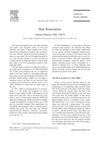Clinical Technique and Outcomes of Platelet-Rich Plasma Application for Treatment of Androgenic and Scarring Alopecia, Acne Scarring, Melasma, and Facial Rejuvenation: A Prospective Multicenter Study
April 2023
in “
Journal of Investigative Dermatology
”

TLDR Platelet-rich plasma treatment is generally safe and effective for hair loss, acne scars, skin discoloration, and facial rejuvenation, but deeper injections are better and multiple treatments can increase risk of side effects.
This multicenter study involved 532 participants, primarily female (67%) and Caucasian (83%), who were treated with platelet-rich plasma (PRP) for conditions such as androgenic alopecia, scarring alopecia, alopecia areata, acne scarring, melasma, and facial rejuvenation. The typical patient had androgenic alopecia and received around 40 injections of PRP per visit without adverse events. However, patients who received 2 or more treatments had a significantly increased risk of adverse events when the injection depth was subcutis and superficial dermis versus deep dermis. Patient self-assessment scores were also significantly lower when the injection depth was subcutis compared to deep dermis. Patient and physician global assessment scores were significantly positively correlated for most indications.






